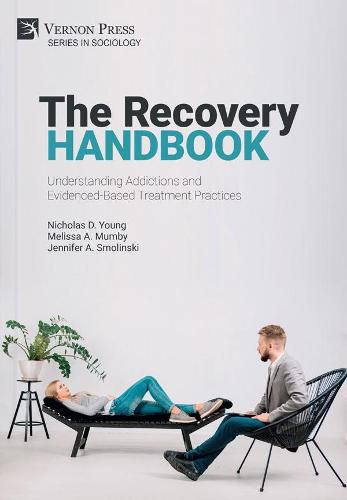Readings Newsletter
Become a Readings Member to make your shopping experience even easier.
Sign in or sign up for free!
You’re not far away from qualifying for FREE standard shipping within Australia
You’ve qualified for FREE standard shipping within Australia
The cart is loading…






This title is printed to order. This book may have been self-published. If so, we cannot guarantee the quality of the content. In the main most books will have gone through the editing process however some may not. We therefore suggest that you be aware of this before ordering this book. If in doubt check either the author or publisher’s details as we are unable to accept any returns unless they are faulty. Please contact us if you have any questions.
Addiction is rapidly becoming one of the most significant challenges to mental health today. According to the latest National Survey on Drug Use and Health (NSDUH, 2018), 19.7 million Americans, aged 12 and older, battled a substance disorder alone in 2017. Additionally, 8.5 million of those individuals also suffered from a mental health disorder, with millions more suffering from a range of other addictive disorders and associated behaviors that interfere with physical, social and emotional health. These alarming statistics highlight the crucial need for mental health providers to be kept up to date with the latest research on the full range of addiction treatment and recovery.
‘The Recovery Handbook: Understanding Addictions and Evidenced-Based Treatment Practices’ provides a comprehensive examination of the various forms of addiction, its physical and mental complexities, and, unlike other sources on addiction, effective evidence-based interventions that promote a healthy recovery. Particular attention is given to the nature of addiction, including environmental, genetic, and developmental factors; with authors examining the short- and long-term effects of a variety of addictions such as drug, alcohol, gambling, food, sex, shopping, work, and video gaming to name a few. This book will serve as a valuable resource for counselors, psychologists, professors, graduate students in the helping professions, as well as families of addicts, co-workers, and those suffering from addiction themselves.
$9.00 standard shipping within Australia
FREE standard shipping within Australia for orders over $100.00
Express & International shipping calculated at checkout
This title is printed to order. This book may have been self-published. If so, we cannot guarantee the quality of the content. In the main most books will have gone through the editing process however some may not. We therefore suggest that you be aware of this before ordering this book. If in doubt check either the author or publisher’s details as we are unable to accept any returns unless they are faulty. Please contact us if you have any questions.
Addiction is rapidly becoming one of the most significant challenges to mental health today. According to the latest National Survey on Drug Use and Health (NSDUH, 2018), 19.7 million Americans, aged 12 and older, battled a substance disorder alone in 2017. Additionally, 8.5 million of those individuals also suffered from a mental health disorder, with millions more suffering from a range of other addictive disorders and associated behaviors that interfere with physical, social and emotional health. These alarming statistics highlight the crucial need for mental health providers to be kept up to date with the latest research on the full range of addiction treatment and recovery.
‘The Recovery Handbook: Understanding Addictions and Evidenced-Based Treatment Practices’ provides a comprehensive examination of the various forms of addiction, its physical and mental complexities, and, unlike other sources on addiction, effective evidence-based interventions that promote a healthy recovery. Particular attention is given to the nature of addiction, including environmental, genetic, and developmental factors; with authors examining the short- and long-term effects of a variety of addictions such as drug, alcohol, gambling, food, sex, shopping, work, and video gaming to name a few. This book will serve as a valuable resource for counselors, psychologists, professors, graduate students in the helping professions, as well as families of addicts, co-workers, and those suffering from addiction themselves.